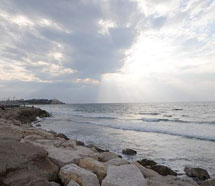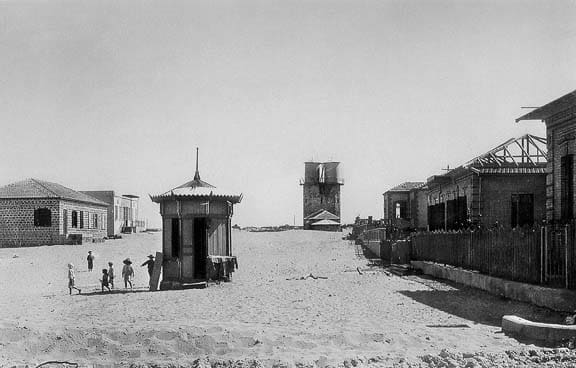
Photos by Rebecca Kowalsky and Toby Klein Greenwald. Text by Toby Klein Greenwald
Whenever I’ve completed work on a particularly exhausting project and feel the need to “get away from it all,” my husband and I do the next best thing to hopping a plane to somewhere abroad. We drive from Efrat to the Beit Shemesh train station, and hop a train to Tel Aviv.
It’s a city where one can find anything – plays, concerts, art, a fabulous flea market in Jaffa, a glorious seashore, flashy hi-rise buildings, business centers, awesome window shopping, a highly-regarded university, museums, conventional and off-beat culture, colorful people and – its secular image notwithstanding – synagogues and yeshivot of every possible viewpoint, and kosher restaurants (though less ubiquitous than in Jerusalem).
I remember that during the first Gulf War, in 1991, Tel Aviv, whose PR tagline was “the city that never stops”, stopped cold, while scuds fell and many people fled. Falling hard on the heels of the unpleasant first intifada, residents of Judea and Samaria reported that distant friends and relatives who had passed up family events in Israel’s historic heartland for fear of having their cars stoned, suddenly spent time visiting people in Gush Etzion, the Binyamin area, the Shomron and Gush Katif, that were safe from scuds. Since then, a war in the north and kasam rockets in the south have reminded us that everywhere we live in Israel (and anywhere), we live by the grace of G-d.
But I digress. Tel Aviv is celebrating its 100th birthday this year. According to the official website of the city of Tel Aviv, the city was actually established in July 1906, at the convention of the Jews of Yafo (Jaffa) held at the Yeshurun Club, though the first lots for land were drawn in 1909.
“The participants complained about the terrible living conditions of Yafo’s Jews, the poor sanitation and congested housing, the badly lit streets, and worst of all the ‘Muhram’ decree which compelled Jews to change their dwelling annually. At the convention, Arieh Akiva Weiss, who had just arrived in the country, proposed the establishment of a new neighborhood outside Yafo. Weiss’ idea was enthusiastically received and Yafo Agudat Bonei Batim (House-Builders Association), forerunner of Ahuzat Bait, was formed at once. It marked the beginning of Tel Aviv. The lottery was held on the second day of Passover 1909. The participants gathered on the sand dunes by the beach. Arieh Akiva Weiss, chairman of the lottery committee, gathered 60 grey and 60 white shells. He wrote the names of the participants on the white shells, and the plot numbers on the grey shells. After all, at stake was nothing less than the allocation of the first plots of the new city developing on the shores of the Mediterranean. Weiss had aptly chosen seashells as lots.” (Source: tel-aviv.gov.il)
As cosmopolitan as Tel Aviv is, it has had its share of poets, like Hungarian born Itamar Yaoz Kest, and Algerian-born Erez Biton. Leah Goldberg (1911-1970), who was born and spent her early childhood in Russia, settled in Tel Aviv in 1935 and became one of Israel’s leading poets.
This is an excerpt from a poem by Leah Goldberg, about her adopted land, called “Pine”:
Here I will not hear the voice of the cuckoo.
Here the tree will not wear a cape of snow.
But it is here in the shade of these pines
my whole childhood reawakens.
…
Perhaps only migrating birds know –
suspended between earth and sky –
the heartache of two homelands.
With you I was transplanted twice,
with you, pine trees, I grew –
roots in two disparate landscapes.
© 1970, Lea Goldberg, from: Collected Poems [Yalkut Shirim]
The words of this author reflect his/her own opinions and do not necessarily represent the official position of the Orthodox Union.



